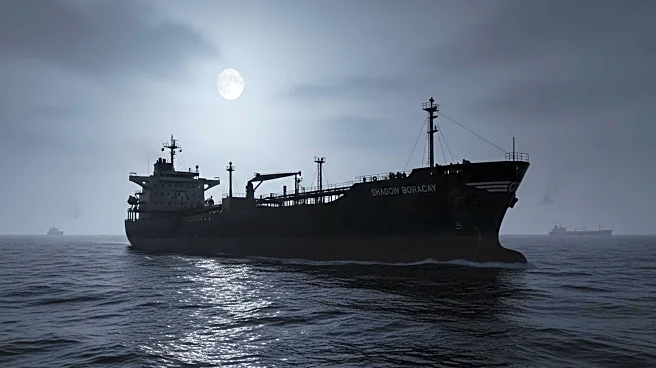What is the story about?
What's Happening?
The shadow tanker Boracay, an 18-year-old crude oil vessel, has resumed its journey after being detained by French authorities. The tanker, known for its elusive operations, has been involved in multiple incidents of false flagging and obfuscation of ownership. Recently, it was held in France due to inconsistencies in its registration, which has changed multiple times over the past year. Despite these issues, the vessel, carrying Russian crude oil, is now headed towards the Suez Canal. French President Emmanuel Macron has announced a new European policy aimed at obstructing the operations of such shadow fleets, which are believed to undermine international sanctions and regulations.
Why It's Important?
The release of the Boracay highlights the challenges faced by European authorities in regulating shadow fleets that operate under false flags and obscure ownership. These fleets pose significant risks to international trade and security, as they often transport sanctioned goods, such as Russian crude oil, circumventing established regulations. The European Union's efforts to disrupt these operations are crucial in maintaining the integrity of international maritime law and ensuring compliance with sanctions. The ongoing situation underscores the need for coordinated international action to address the complexities of maritime enforcement and the economic implications of shadow fleet activities.
What's Next?
French President Macron's announcement of a 'coalition of the willing' suggests that European nations will intensify their efforts to disrupt shadow fleet operations. This coalition may lead to increased inspections and detentions of vessels suspected of false flagging and other illicit activities. The upcoming meeting of European leaders could result in new strategies and policies aimed at strengthening maritime enforcement. Additionally, the captain of the Boracay is expected to return to France in February to face charges related to non-compliance with French authorities during the vessel's detention.
Beyond the Headlines
The operations of shadow fleets like Boracay raise ethical and legal questions about the enforcement of international maritime laws and the effectiveness of sanctions. The ability of these vessels to evade detection and continue their operations challenges the current regulatory frameworks and highlights the need for technological advancements in tracking and monitoring maritime activities. Furthermore, the geopolitical implications of these fleets, particularly in relation to Russian crude oil shipments, could influence international relations and trade policies.
















